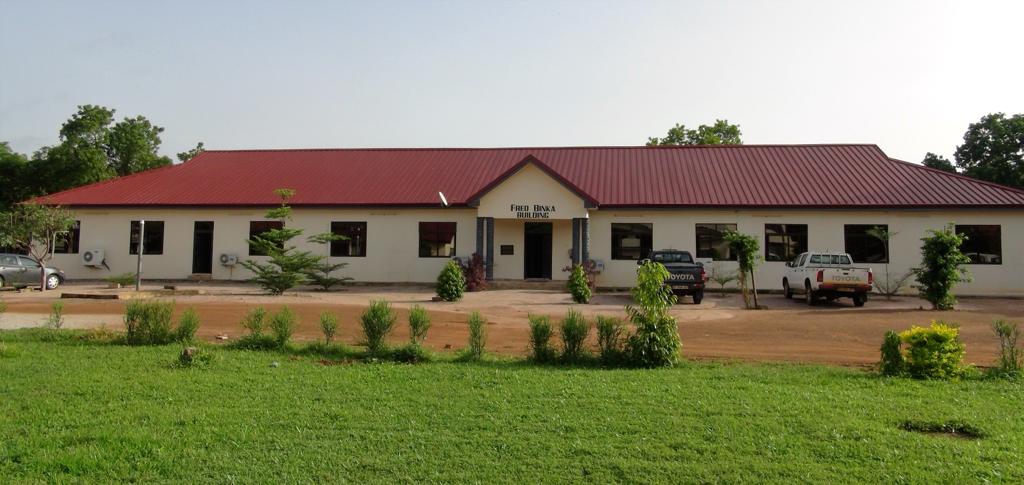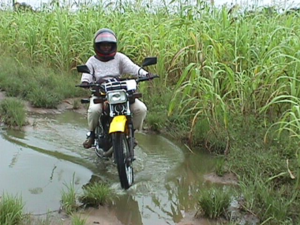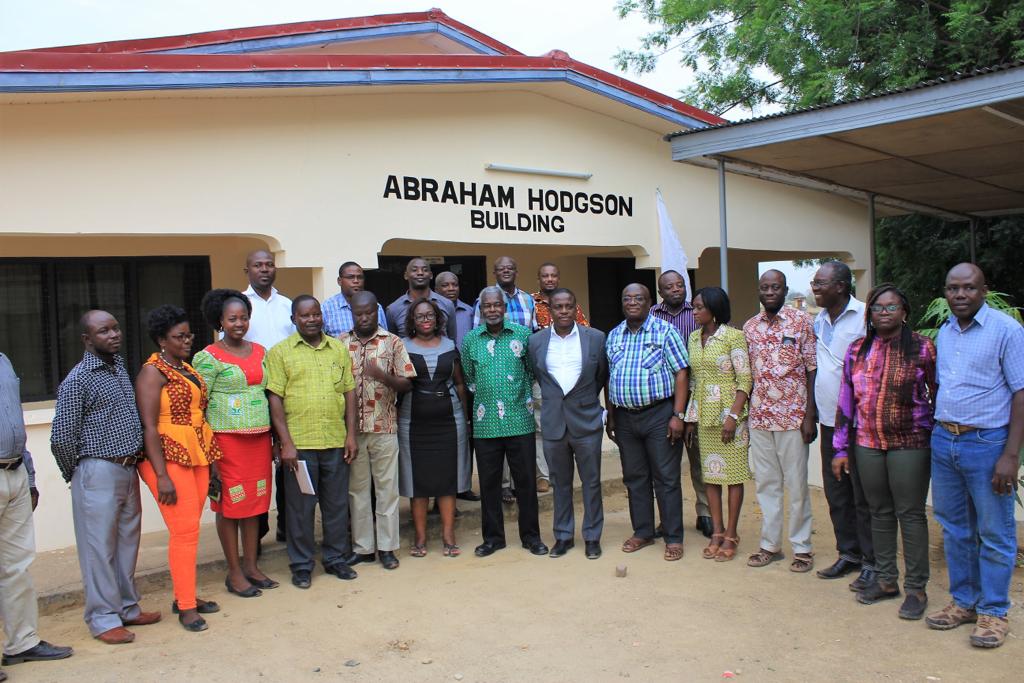The NHRC – building a Centre of excellence in health science in Ghana

From its modest beginnings in 1988, the Navrongo Health Research Centre (NHRC) in the Upper East Region, has made great strides and extended its operations to cover research activities involving clinical trials, social intervention and evaluation studies.
The NHRC is one of the three research centres of the Research and Development Division of the Ghana Health Service. It started as a field site set up to investigate the impact of repeated large doses of Vitamin A Supplementation on child survival known as the Ghana VAST project in the Kassena-Nankana District of the Region.
According to Dr Patrick Odum Ansah, Acting Director of the NHRC, the centre was “upgraded in 1992 into a Research Centre by the Ministry of Health and named Navrongo Health Research Centre.”
It was also set up “to contribute to capacity development and service delivery in the health sector,” he explained and added that it was additionally to, “enhance the development of evidence-based policies by generating relevant and empirical knowledge, and information on priority health areas.”
The NHRC was therefore given the mandate to investigate national and international health issues.
Despite the achievements of the Centre, over the years, carrying out its research activities has not been easy due to some challenges. Among the challenges are issues of unstable supply of power and Internet services and the attrition of senior long-term and senior scientific staff and funding.
“We have about 31 scientists from Msc to PHD level. Outlook is mixed. There is still great potential in the full capacity of the Centre. More fellows are coming back with diverse expertise as the more experienced ones are moving on to higher levels of their career,” he told Ghana Business News in an interview over the messaging app WhatsApp.

When Ghana Business News asked what challenges the Centre is facing, Dr. Ansah said; “Our challenge is availability of core funding which underlies most of our difficulties. Maintenance of the research platform, sustaining high calibre staff who have been trained by the Centre but now highly sought after in the job market and more investment on the research platform with respect to equipment and more infrastructure.”
With the outbreak of the COVID-19 pandemic, came challenges and opportunities, and for the Centre, the pandemic also brought along some difficulties and opportunities.
“Funding is now challenging as most funders are cutting down on funds due to the global economic situation and COVID-19. However, in the same vein a lot of funding is accessible for work on COVID-19 and related problems. It’s fairly balanced,” he told Ghana Business News.
“Currently our major funders are government of Ghana, pharmaceutical companies for the clinical trials, USAID, some American universities and National Institute of Health Research of the UK,” he added.
In the face of the challenges, the Centre has a tall list of research activities to its credit, some of which have focused extensively on malaria prevention and control, reproductive health, cerebro-spinal meningitis epidemiology and rotavirus epidemiology.
Mission
The NHRC’s past and current activities are in line with its mission to conduct research into major national and international health issues.
The aim is to inform policy for the improvement of health by focusing primarily on assessing the impact of interventions through field and clinical trials, social and demographic research, and human resource development.
The Centre has been very active in working with different institutions in collaborative studies in and outside Ghana.
For instance, the NHRC was part of a team of African researchers who conducted one of the largest phase 4 studies in Africa known as INESS. This study was concerned with the use of antimalarials and included other researchers from the Dodowa and Kintampo Health Research Centres in Ghana and others from Tanzania, Mozambique and Burkina Faso formed the research team.
The INESS study introduced innovative ways of monitoring patients after treatment for malaria to determine progress, ensure adherence to instructions on drug intake and to look out for any possible side effects.

Due to the INESS project, the researchers and Centres where the studies were conducted were able to build capacities to undertake any phase 4 clinical trials into different drugs, vaccines and other medical products.
Some key findings from the INESS project pointed to the importance of the management of malaria within some communities in Ghana.
For instance, a key issue that emerged from the NHRC research activities in two districts in the Upper East Region pointed to the poor management of malaria in some particular cases and this added to the conclusions drawn from the INESS study.
The NHRC has completed a number of projects and among these are field experiments on technology adoption in the context of improved cook stoves, studies into malnutrition, water, sanitation and hygiene in health care facilities.
Ongoing projects
Currently, the NHRC is engaged in an international study being carried out by its Social Science Department to address knowledge gaps in community engagement (CE) strategies. This study is aimed at investigating the role of community engagement in genomic research and bio-banking in sub-Saharan Africa. It is a collaborative research project across six African countries: Ghana, Nigeria, South Africa, The Gambia, Tanzania and Kenya.
It is directed at identifying best practices for feeding back genetic findings and results to individuals, groups and communities.
The study is also looking at strengthening capacity in ethics and community engagement within the consortium by providing training opportunities on ethics and community engagement.
Another aim of the study is to help set up a resource centre for ethics and community engagement to support the implementation of genomic research across sub-Saharan Africa.
Another ongoing multi-site and clinical studies taking place at the NHRC is a prospective study to estimate the incidence of diseases specified as adverse events of special interest which lead to hospitalization or death, including looking at meningitis in infants and young children in sub-Saharan Africa prior to implementation of the RTS,S/AS01E candidate vaccine.
The Centre is also working at adapting the WHO Cardiovascular Disease Risk Management Package to the Ghanaian Community-Based Health Planning and Services (CHPS) at the primary health care level.
This study is seeking to understand how nurses, community members and community volunteers think depression should be treated.
It would also evaluate how the CHPS facility might provide care for depression and seek feedback on the acceptability of the intervention to treat depression and hypertension at the CHPS level.
Again, the Centre is preparing to conduct a clinical trial of a Lassa fever vaccine once it gets appropriate approvals.
The primary purpose of this study is to evaluate the safety of the vaccine in human beings before it proceeds to further clinical studies.
The NHRC has recently joined other researchers in and outside Ghana to undertake a phase-3 clinical trial to assess the efficacy of the Sanofi vaccine in preventing the COVID-19.
The Sanofi vaccine trial at the NHRC is also being done at the Kintampo Health Research Centre and the Kumasi Centre for Collaborative Research together with other clinical sites in 16 countries such as Nigeria and Nepal.
The NHRC has a solid research laboratory that serves as a support unit to carry out its research activities.
The laboratory plays a critical role in both biomedical research and clinical trials undertaken by the institution. It also provides support for all the drug and vaccine trials that are being undertaken by the Centre.
The NHRC has also acquired various equipment such as chemistry, haematology and electrolyte analysers including new vaccine fridges to help in its research activities.
And Dr Ansah believes, as he says; “Over all we have a bright future as currently we are handling a wide array of studies which will impact positively on the health of our population.”
While the Centre and its work has continued to benefit the Ghanaian public, it doesn’t appear that most citizens are aware of its existence.
Asked if he thinks the Ghanaian public is aware of the great work the Centre has been doing, he responds: “No. The public is not well informed about the clinical trials going on here. That’s why we are so grateful for the work done by the African Media and Malaria Research Network (AMMREN) in our Centre recently. We have more people calling to find out more. Our plan is to engage the media more regularly. Probably monthly or quarterly for now,” he said.
By Eunice Menka
Copyright ©2021 by NewsBridge Africa
All rights reserved. This article or any portion thereof may not be reproduced or used in any manner whatsoever without the express written permission of the publisher except for the use of brief quotations in reviews.
